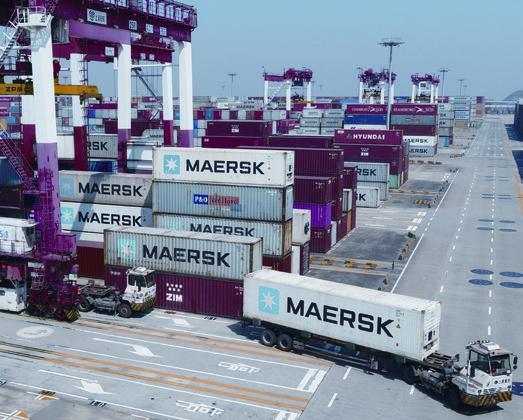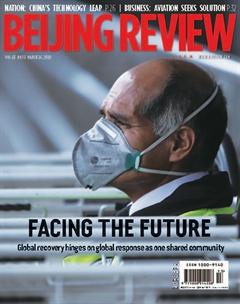A CHANCE FOR A RESET
By Michael Zakkour

The spread and effects of the novel coronavirus disease 2019 (COVID-19) have been so rapid and widespread that attempting to make sense of what is happening, let alone write about it, has often been an exercise in frustration at best and futility at worst.
Case numbers, industry shutdowns, retail closures, markets dropping, economic disruption, supply chain disruption, geopolitical implications—news on all of this and more is rolling in and changing on an hourly basis.
With all of this in mind, I believe three key facts will go a long way to determining what the long-term impact of the pandemic will be on the global economy, national economies and the living standards of the worlds 7 billion people.
All three of them are centered around the relationship between China and the U.S.
The first is that China, the U.S. and most of the world are, for all intents and purposes, in a de facto recession that will deepen in Q2 and Q3 and threatens to become a depression.
The second is that the worlds two largest economies, China and the U.S., are now escalating a negative relationship when the world needs the two to work together, not to decouple.
The third is that this is a unique event and time in modern history and there is a chance for a reset and rethink on the way we all make, move, sell, buy, live and treat the shared Earth we live on.
I have put these facts in this order because this is the order in which we need to think about the crisis. Clear thinking and actions on one leads to clear thinking and action for number two which creates the environment to tackle number three.
Looming recession
The official numbers from China, the U.S. and elsewhere have not yet caught up with the reality that with the Chinese economy on hold for the better part of three months, and U.S. and European economic activity on hold, combined with the universal plunge in global equity markets, we are in the early stages of domestic and global recession.
With the virus spreading to the U.S., Europe and the rest of Asia, and the farreaching impact we now understand the crisis had on Chinas economy, global economists, banks, fi nancial organizations and governments are recognizing that the“base assumption” for the rest of 2020 is a global recession with growth slowed to anywhere between 0.5 and 1.2 percent.
There is optimism in this reality though. As hard hit as China has been, the country is getting back to work, the economy is stabilizing and life is, in many ways, getting back to normal. This provides the world with a timeline on how the process of virus emergence, spread, economic slowdown and resumption of normal activity can play out.
However, the shadow that is looming over the U.S. and global economic outlooks is that of a deep prolonged recession or more hauntingly, the potential for a rapid descent into a global depression in the order of 1929. The question that remains to be answered is: Will the economic effects of COVID-19 be more like 1929, 1987, 2001 or 2009? Or will we be facing a situation with no precedent?
How the global economy suffers, recovers and changes will largely depend on how China and the U.S. respond, cooperate (or not) and shape the global outlook.
Two giants, one future
When the COVID-19 situation was, in the beginning, only known to be taking place in China and as China put in place strong measures to slow and stop the spread of the virus, the worlds focus was on what it meant for China and to a lesser degree, what it might mean to global supply chains.
Despite China now being a major consumer, service and technology economy, it is still the largest manufacturing hub in the world and hundreds of thousands of companies depend on Chinas factories to produce their goods.
Enterprises as diverse as Apple, Walmart and Nintendo, as well as many of the worlds apparel brands, are reporting that their ability to bring products to market may be affected by an extended disruption in Chinese manufacturing.
The logical extension of this reality is how interconnected the global economy, economic activity and the means to make, move, sell and buy everything is. This expansion of the crisis has revealed to many people, companies and governments just how fragile our digitally connected, supply chain connected and economically connected world is. How unforeseen black swan events can, in the right circumstances, disrupt a fragile balance.
So where does that leave us? It leaves us dealing with the reality that the two largest economies in the world and the two most infl uential countries in the world, China and the U.S., have been, are and will be profoundly affected by this black swan event, and that the rest of the world is being impacted as well if not more so.
At this time, when unity, cooperation and collaboration are needed, the U.S. and China are not only not working together to lead the world back from the precipice of disaster, but quite the opposite.
They have been in a protracted trade war for more than two years and now are waging a rhetorical war on who is to blame for the emergence and spread of the virus.
The virus emerged from nature. It is not a “Chinese virus” or “American virus.” It is a virus that attacks, sickens and kills people of every kind. No one is to blame for it.
I know there are many on both sides who will view me as na?ve and idealistic for what I am about to say next, but I believe it and I think there are many others who do as well.

The U.S. and China must both take up global leadership roles and work together to attack a global human problem. There is so much wisdom and scientific, economic and cultural power potential in both countries, and the world needs the leadership and help of both.
The last thing the world needs is an increasingly antagonistic and Cold War-level breakdown between the two giants. Much of how the world economy turns out in the next six-18 months will depend on the individual actions, relationship and combined approach of China and the U.S..
Anything less could lead to a deep and long global recession or the dreaded depression.
Time to reflect
Finally, we can take a moment to pause here and listen: Listen to nature, listen to Earth, listen to the noise we create daily and assess what all of this means not just from a financial, trade and business perspective but from a human perspective.
Its almost as if Earth is telling us we need to hit the pause button. That the world needs a break from production, pollution and politics. The skies over China are bluer, the water in Venices canals is cleaner, and the streets in New York are less cluttered with trash.
This is a moment we can reflect on how we make, move, sell, buy and trade, how and what we consume, and the waste we produce. If we cannot overcome this virus together, then the prospects for saving our planet from environmental destruction, overpopulation and lack of resources might be bleak.
If we cannot take a moment now and think about reconnecting with our families, our friends and our colleagues and as a species, then perhaps the global economic fallout of COVID-19 might be the least of our problems and concerns.

